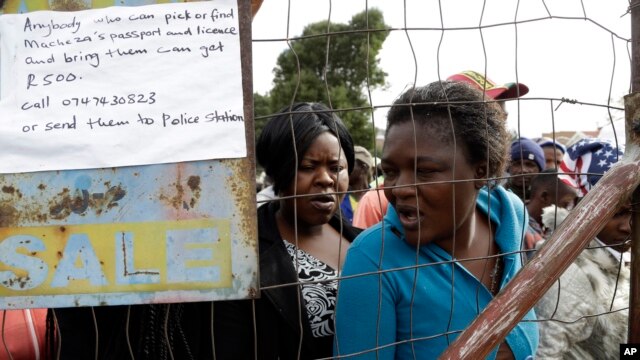FILE – Women fleeing attacks on immigrants line up for food at a temporary refugee camp in east of Johannesburg, South Africa, Apr. 20, 2015.
Human rights activists say South Africa’s security forces are promoting xenophobic attacks and legitimizing hatred with their recent roundup and arrest of foreign nationals in Johannesburg and Durban. Many of those detained, they say, have been denied access to lawyers and basic amenities.
The xenophobic attacks that rocked South Africa last month have subsided, but activists say that for an estimated 300 to 400 African immigrants detained in a police sweep, the nightmare is far from over.
Last week, South Africa’s government launched “Operation Fiela,” or “sweep out dirt.” The government said the nationwide operation was an attempt to crack down on crime and restore order in areas affected by xenophobic violence in April.
That violence killed at least eight people and forced thousands more to flee to their home countries or safer locations in South Africa.
During Operation Fiela, activists say, police and soldiers rounded up residents of Johannesburg and Durban and have since held them without access to legal representation, without checking their immigration status, and without allowing them basic amenities like essential medications and sufficient drinking water.
Activist Stephen Faulkner says rights groups deplore the government’s connection between illegal immigrants and crime.
“To equate crime with the presence of undocumented people in our society is not tackling xenophobia. It is legitimizing xenophobia,” he said. “It is saying to the general public, ‘we have to tackle xenophobia by getting rid of illegal immigrants.’”
Denial of basic rights
Lawyer Wayne Ncube of Lawyers for Human Rights says his group is concerned about the fact that the detainees have been denied their basic rights.
“Our main concern with what has happened, as we speak, we still have only seen two of the detainees, barring the women and children who have been transferred to Gift of the Givers [a South African charity]. And this is now four days after the operation, after they were arrested,” he said.
Those affected say they are traumatized. Many immigrants to South Africa say they have fled instability, political persecution and a lack of economic opportunities at home. Many also say their deportation would amount to a death sentence.
Safety concern
Journalist Solomon Amabo, who says he fled his native Cameroon after facing harassment over his work, says he was terrified in late April when xenophobic protesters attempted to break into his apartment in central Johannesburg. Amabo says he managed to flee through a window and is now staying in a secure location. The attack forced him to quit his job in central Johannesburg out of fear for his safety.
He says the violence has shattered his sense of security.
“Something terrible happened in South Africa. For me, I sit and I hear people breaking into doors and coming to beat me. I don’t feel free again and safe in South Africa. And I’m not alone in this condition,” he said.
The number of immigrants arrested is just a tiny portion of South Africa’s population of foreign nationals. The government has no firm numbers for that population but estimates have ranged from anywhere between 1 to 10 million.
FRENCH VERSION
Les attaques xénophobes qui ont secoué l’Afrique du Sud le moisdernier ont disparu, mais les militants disent que pour un estiméimmigrants africains de 300 à 400 détenus dans un ratissage de la police, le cauchemar est loin d’être terminée.
La semaine dernière, gouvernement de l’Afrique du Sud a lancé « Opération Loula, » ou « coup de poing sur terre. » Legouvernement a déclaré que l’opération à l’échelle nationalevisait à réprimer la criminalité et rétablir l’ordre dans les zonestouchées par les violences xénophobes en avril.
Que la violence a fait au moins huit morts et contraint des milliers plus à fuir leur pays d’origine ou des endroits plus sûrs enAfrique du Sud.
Au cours de l’opération Loula, militants disent, policiers et soldatsarrondi résidents de Johannesburg et Durban et ont lieu depuiseux n’ont pas accès à une représentation juridique, sans vérifierleur statut d’immigré et sans leur permettre des équipements debase comme les médicaments essentiels et suffisamment d’eaupotable.
Activiste groupes droits déplorent connexion du gouvernemententre immigrés clandestins et le crime, dit Stephen Faulkner.



